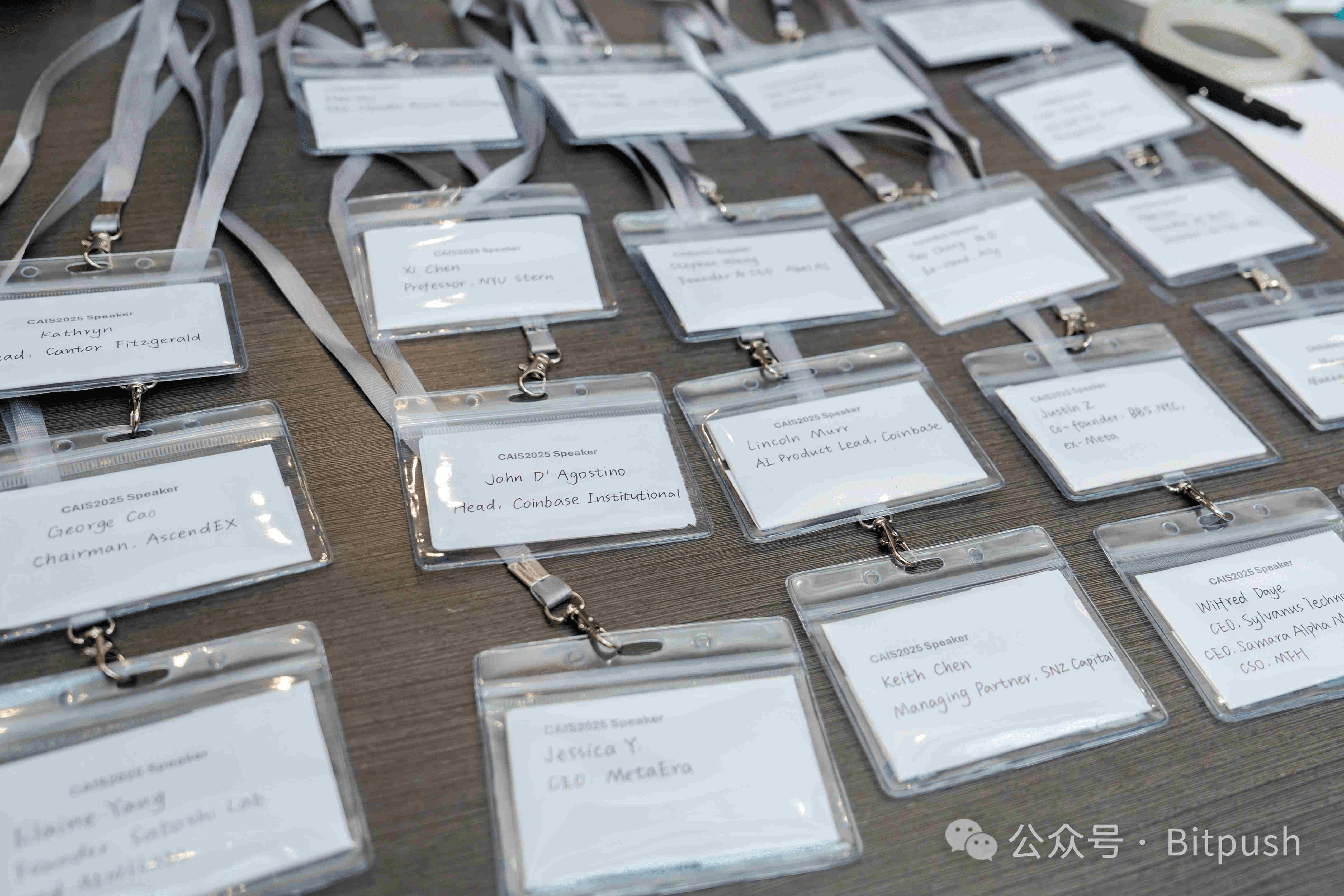
On May 10, 2025, the CryptoAI Summit 2025, hosted by Bitpush and co-organized by TCFA, successfully concluded in New York.
The summit focused on 'the integration of AI and crypto technology', inviting nearly 30 experts from top institutions such as Coinbase, Citigroup, Cantor Fitzgerald, MSCI, Columbia, and Solana Foundation to discuss cutting-edge topics such as digital assets, artificial intelligence, regulatory trends, Web3 infrastructure, and the investment and financing ecosystem.
This is a high-density collision of ideas connecting tradition and the future, capital and technology, with plenty of valuable content throughout the day and a lively atmosphere.



Opening Speech
Jointly delivered by May Liu, Managing Editor of Bitpush, and Joy Zhang, Chairman of TCFA, the summit commenced, emphasizing the necessity and urgency of 'cross-border dialogue' and urging the financial and innovation circles to 'break boundaries and move towards integration'.


Keynote Speech: Global Trading in the Era of Digital Assets
Keynote speech delivered by John D'Agostino, Head of Strategy at Coinbase Institutional, with Joy Zhang as the moderator.
John delved into how institutional funds are adapting to the structural changes of the crypto era. He interpreted the entry logic and risk preference of traditional institutions under the trend of AI and crypto integration from multiple dimensions, including macro policy, institutional fund flows, and market structure evolution, sharing the shift from Wall Street to crypto institutional strategies, pointing out that clearer regulation is a prerequisite for large-scale institutional entry.
John pointed out that in the coming years, stablecoins, on-chain settlements, and AI-driven trading systems will become key areas of interest for capital markets.

Panel 1: Regulation and Deregulation - Crypto Challenges in the Trump Era
Moderated by Wilfred Daye (CEO of Sylvanus), the guests include Ivan Zhang, co-founder of PennyWorks, Jue Wang, Legal Director of BitMart, Hao Wu, CEO of Clouder Power, and Winston Ma, co-founder of Dragon AI.
Discussions involve legislation on stablecoins, state-level Bitcoin reserve policies in the U.S., trends in sovereign fund investments, and the prospects for DeFi legalization. The guests pointed out, 'The U.S. has an onion structure for crypto regulation - multilayered and intertwined, but with a clear direction: institutionalization.'

Fireside Chat: Restructuring the World View of AI + Crypto
A remote conversation between Maggie Wang, Managing Director at Citigroup and TCFA President-Elect, and Kathryn Zhao, Global Electronic Trading Director at Cantor Fitzgerald.
Kathryn analyzed the bidirectional relationship of 'how AI can enhance the crypto user experience, and how crypto can feedback into the AI model trust mechanism' from the perspectives of trading practices, cross-asset arbitrage, and AI-Agent applications. Her proposed concept of 'AI agents + blockchain authentication' garnered wide attention.

Panel 2: Crossing the Boundaries of AI - Innovation Trends and Real-World Challenges
Hosted by Maggie Wang, guests include Columbia professor Zhou (Jo) Yu, former Senior Analyst and AI Director at Ally, Dr. Tao Cheng, CEO of DistributedApps.ai Ken Huang, and CTO Dr. Jay Zou of NBW.

Guests looked ahead to the democratization of AI from perspectives such as 'building large models', 'decentralized computing networks', and 'privacy data training mechanisms'. Jo Yu emphasized, 'The next generation of AI tools should be shaped collaboratively by developers and the community, rather than being monopolized.'
Panel 3: Ethereum VS Solana - The Performance Battle of Web3
Moderated by Lincoln Murr, Head of AI Products at Coinbase, with technical exchanges between Han Liu, founder of BitFi, Chaz, founding engineer of Solayer, and Jiani Chen, head of growth at the Solana Foundation.

From TPS to developer ecosystems, the Solana side emphasizes 'performance and cost', while the Ethereum camp highlights 'stability and security'. The guests believe that whoever can integrate the strongest liquidity will win the long-term favor of developers. The sharp viewpoints on site made it the most technically charged dialogue of the event.
Panel 4: Finding the Next Hundredfold Coin - The Art of Speculation
Moderated by Jessica Y, CEO of MetaEra, with guests including Tian Zeng, co-CIO of Third Eye, George Cao, Chairman of AscendEX, and Sichao Yang, CTO of OORT.

Everyone acknowledged, 'Speculation is not the original sin; cognitive and information gaps are the core alpha.' In an era driven by narratives, institutions prefer to structure products to invest in high-volatility assets, while retail investors need to pay attention to position management; how to 'invest early', 'invest correctly', and 'hold on' has become a common topic for both retail and institutional investors.
Panel 5: Venture Capital in the Age of AI and Crypto
Moderated by renowned entrepreneur and investor Bianca Chen, with investment experiences shared by Keith Chen, partner at SNZ Capital, Seamon Chan, founding partner at Palm Drive Capital, and Elaine Yang, founder of Satoshi Lab.
Guests unanimously pointed out that today's VCs need to understand the structure of AI models, on-chain incentive mechanisms, and human nature simultaneously. The integration of AI and crypto is reshaping the rhythm of investment and financing and the logic of project evaluation. In addition, sovereign funds from the Middle East and Asia are returning to the Web3 investment chain, particularly focusing on AI Infra and Layer 1 protocols.

Panel 6: AI Agents + Meme Coins - The Next Generation Market Makers?
Moderated by Stephen Wang, founder and CEO of Abel AI, the guests include NYU professor Xi Chen, SOON Network CEO Joanna Zeng, Protego Trust CIO Weiyee In, UCSD professor and Abel.ai CTO Biwei Huang.

Meme culture × AI trading agents have become the new narrative focus. Discussions cover topics such as 'Can AI become an assistant for on-chain users?', 'Can memes evolve into cultural assets?', and 'Do intelligent agents change market microstructures?'. Beyond the main topics, guests also delved into discussions on AI model safety, data misuse, and AI credibility verification mechanisms. The guests unanimously agreed that the transparency of AI agents, verifiable behaviors, regulation, and data traceability are key to the future integration of AI and finance.
